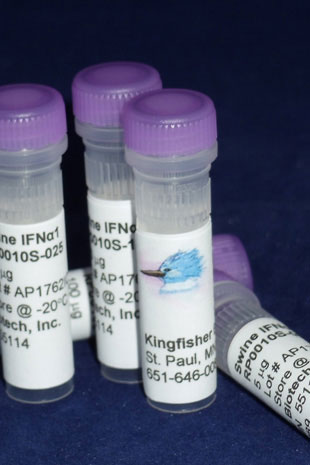Swine IFN alpha 1 (Yeast-derived Recombinant Protein) - 25 micrograms
Bulk quantities of proteins are available. Please contact us for pricing.
Type I interferons comprise a vast and growing group of IFN proteins. Homologous molecules to type I IFNs are found in many species, including all mammals, and some have been identified in birds, reptiles, amphibians and fish species. The mammalian types are designated IFN-alpha, IFN-beta, IFN-kappa, IFN-delta, IFN-epsilon, IFN-tau, IFN-omega, and IFN-zeta (also known as limitin). They are mainly involved in innate immune response against viral infection.

Evaluation of PRRSv specific, maternally derived and induced immune response in Ingelvac PRRSFLEX EU vaccinated piglets in the presence of maternally transferred immunity.
Kraft C, Hennies R, Dreckmann K, Noguera M, Rathkjen PH, Gassel M, Gereke M.
PLoS One. 2019 Oct 2;14(10):e0223060. doi: 10.1371/journal.pone.0223060. eCollection 2019.
Applications: Measurement of Swine IFN alpha in bronchial alveolar lavage fluid by ELISA
Abstract
In this study, we analyzed PRRS virus (PRRSv) specific lymphocyte function in piglets vaccinated with Ingelvac PRRSFLEX EU® at two and three weeks of age in the presence of homologous maternal immunity. Complete analysis of maternal immunity to PRRSv was evaluated postpartum, as well as passive transfer of antibodies and T cells to the piglet through colostrum intake and before and after challenge with a heterologous PRRSv at ten weeks of age. Maternal-derived antibodies were detected in piglets but declined quickly after weaning. However, vaccinated animals restored PRRSv-specific antibody levels by anamnestic response to vaccination. Cell analysis in colostrum and milk revealed presence of PRRSv-specific immune cells at suckling with higher concentrations found in colostrum than in milk. In addition, colostrum and milk contained PRRSv-specific IgA and IgG that may contribute to protection of newborn piglets. Despite the presence of PRRSv-specific Peripheral Blood Mononuclear cells (PBMCs) in colostrum and milk, no PRRSv-specific cells could be detected from blood of the piglets at one or two weeks of life. Nevertheless, cellular immunity was detectable in pre-challenged piglets up to 7 weeks after vaccination while the non-vaccinated control group showed no interferon (IFN) γ response to PRRSv stimulation. After challenge, all piglets developed a PRRSv-specific IFNγ-response, which was more robust at significantly higher levels in vaccinated animals compared to the primary response to PRRSv in non-vaccinated animals. Cytokine analysis in the lung lumen showed a reduction of pro-inflammatory responses to PRRSv challenge in vaccinated animals, especially reduced interferon (IFN) α levels. In conclusion, vaccination of maternally positive piglets at 2 and 3 weeks of age with Ingelvac PRRSFLEX EU induced a humoral and cellular immune response to PRRSv and provided protection against virulent, heterologous PRRSv challenge.
Ordering Information & Terms and Conditions
We require a phone number and e-mail address for both the end user of the ordered product and your institution's Accounts Payable representative. This information is only used to help with technical and billing issues.
Via Phone
Please call us at 651-646-0089 between the hours of 8:30 a.m. and 5:30 p.m. CST Mon - Fri.
Via Fax
Orders can be faxed to us 24 hours a day at 651-646-0095.
Via E-mail
Please e-mail orders to orders@KingfisherBiotech.com.
Via Mail
Please mail your order to:
Sales Order Entry
Kingfisher Biotech, Inc.
1000 Westgate Drive
Suite 123
Saint Paul, MN 55114
USA
Product Warranty
Kingfisher Biotech brand products are warranted by Kingfisher Biotech, Inc. to meet stated product specifications and to conform to label descriptions when used, handled and stored according to instructions. Unless otherwise stated, this warranty is limited to one year from date of sale. Kingfisher Biotech’s sole liability for the product is limited to replacement of the product or refund of the purchase price. Kingfisher Biotech brand products are supplied for research applications. They are not intended for medicinal, diagnostic or therapeutic use. The products may not be resold, modified for resale or used to manufacture commercial products without prior written approval from Kingfisher Biotech.
Payment Terms
All prices are subject to change without notice. Payment terms are net thirty (30) days from receipt of invoice. A 1.5% service charge per month is added for accounts past due over 30 days. Prices quoted are U.S. Dollars. The purchaser assumes responsibility for any applicable tax. You will only be charged for products shipped. Products placed on back order will be charged when shipped. If you place an order and fail to fulfill the terms of payment, Kingfisher Biotech, Inc. may without prejudice to any other lawful remedy defer further shipments and/or cancel any order. You shall be liable to Kingfisher Biotech, Inc. for all costs and fees, including attorneys' fees, which Kingfisher Biotech, Inc. may reasonably incur in any actions to collect on your overdue account. Kingfisher Biotech, Inc. does not agree to, and is not bound by, any other terms or conditions such as terms in a purchase order that have not been expressly agreed to in writing signed by a duly authorized officer of Kingfisher Biotech, Inc.
Shipping
Shipping and handling costs are prepaid and added to the invoice. Shipping and handling costs will be charged only on the first shipment in situations where an order contains back ordered products. Kingfisher Biotech, Inc. reserves the right to select the packaging and shipping method for your order, which will ensure the stability of the product and also efficient tracing. Domestic orders will normally be shipped by overnight. Damage during shipment is covered by the warranty provided in these terms and conditions. For international orders, title to the goods passes in the United States when the goods are placed with the shipper. For all orders, the risk of loss of the goods passes when the goods are placed with the shipper.
Returns
Please call customer service before returning any products for refund, credit or replacement. NO returns will be accepted without prior written authorization. Returns are subject to a restocking fee of 20%.



 New Products
New Products Ordering
Ordering Distributors
Distributors Resources
Resources FAQs
FAQs Cart
Cart